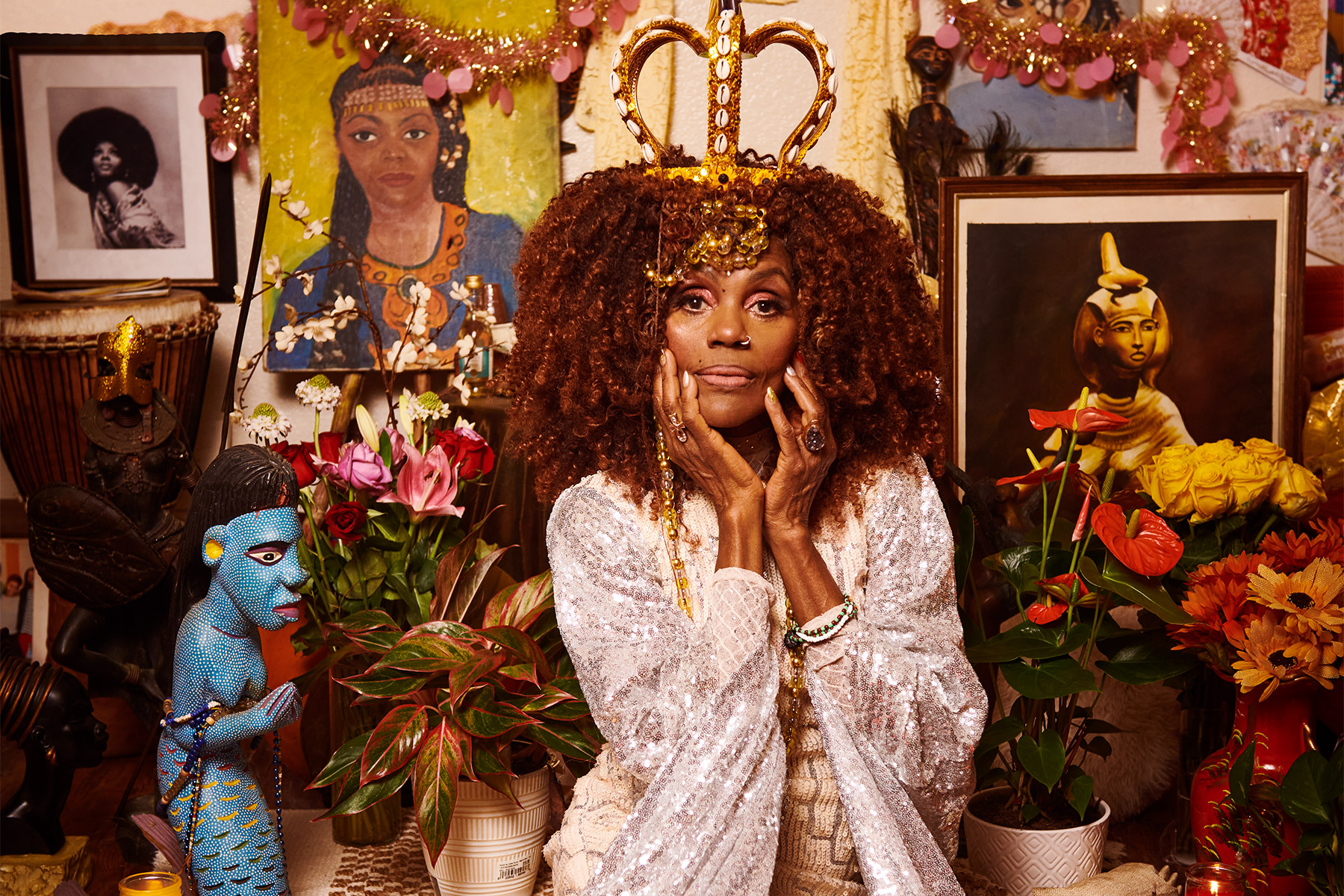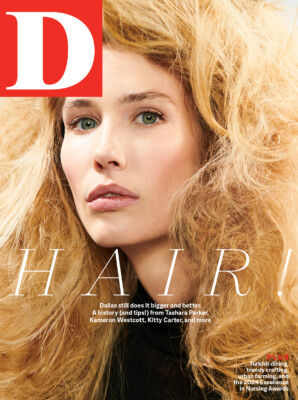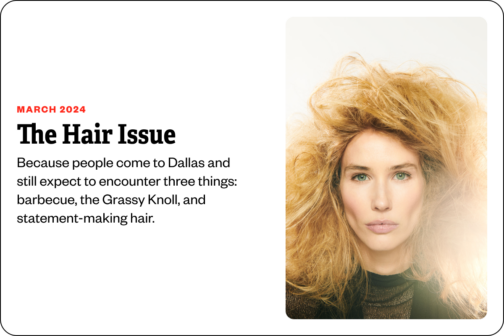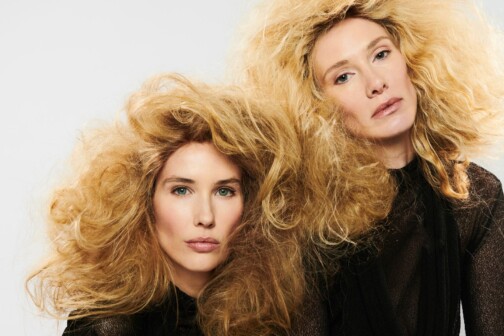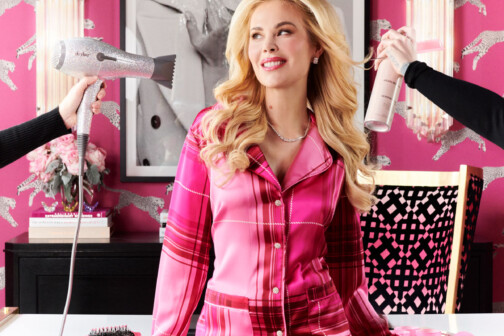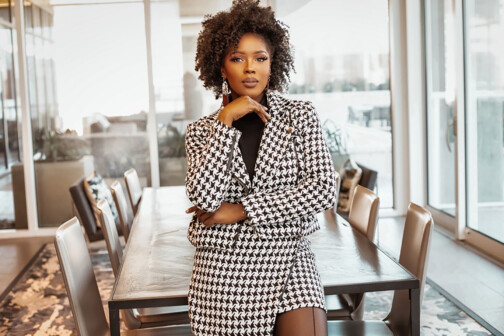“My people originated from Mali in West Africa. Many of the tribes believe that God lives in our hair. I say, yes, God does live in our hair because of the melanin and of the way that it grows. It grows up towards the heavens, just like everything in nature. The plants grow up; the trees grow up. Everything in nature gets its electromagnetic energy from the heavens. So the sun is directly connected to everything that we need down here. Same with our hair.
“God lives in our hair. This is our God’s spirit. So when we talk about the spirit of God, it’s nothing outside of us. It’s that little, bitty soft spot on the top of our heads that we’re born with, and all of that energy that we put into our heads. So if we’re putting in a lot of doubt, if we’re putting in a lot of fear, if we are being given an image of us that is not us, we take that in the same as with our positive attributes.
“[Growing up in Bonton,] you couldn’t go out of the house if you weren’t pretty. You had to dress up, make sure your hair is right. So that’s when I got started, as a young girl, 9, 10, watching everybody else. And I started braiding. It’s in my DNA, my bloodline. Being from West Africa, my ancestors are from the continent of braiders. We had the magic in our hands.
“You could not go across the tracks with your braids. You couldn’t wear your afro. When you go across the tracks, you’re going into the school system. You’re going maybe to downtown Dallas, where you still had ‘For Colored’ and ‘White Only’ fountains, which we never paid attention to. But you would have to straighten your hair. That was the only way you were considered pretty. In the summer, when you’d go swimming, you were braiding it. We did our thing in our own community. It was just when we had to leave and go outside of the community that you had to look a certain way.
“I had this fantasy about being this beautiful I Dream of Jeannie kind of lady. I always had this signature style with my hair slicked back and a ponytail at the back of my hair. Everywhere I would go, people knew me because they were like, ‘Oh, I Dream of Jeannie!’ because I was really channeling that energy from that show.
“You watch TV, the standard of beauty is European, Caucasian. To make sure that you get that job or maybe advance in this particular area, you had to move apart. So all of who we were was stripped away. But I carried braiding into my adulthood. I was like, you know what? Now I don’t have to please my mom. I don’t have to look a certain way to go to college now. Let me just braid my hair.”
In 1981, Brantley opened the African Braiding Studio in Dallas, where she braided hair, taught classes, and introduced her own line of all-natural hair products. Sixteen years later, in 1997, she was arrested for operating a salon without a license.
“I was fingerprinted, strip-searched, and thrown into jail. A mother of five, single parent, entrepreneur—I never knew it was against the law. Seven cops came into my salon and said, ‘You’re going to jail.’ I was like, ‘Jail? For what?’ It was against the law to braid hair in Texas. I had no idea. For 10 years I had been expressing myself and my heart and my gift in that way.
“They had a whole full-fledged trial for me. They found me guilty because Larry Perkins [the director of enforcement for the Texas Cosmetology Commission] said, ‘She uses brushes, and the brushes contain lice,’ when everybody that knows anything about braiding knows that you don’t use no damn brush. The jury was all White, so they just listened. They said, OK—$600. So I had a fine I had to pay.”
Noted: “America’s history with African hair needs to be told because we don’t know that.”
Brantley paid the fine and started braiding out of her home, but she continued to fight for changes to the regulations. In 2007, the state training requirement for hair braiding was reduced to 35 hours; Brantley was grandfathered in and given a license to braid, but she still was not allowed to teach. With the help of the nonprofit Institute for Justice, she filed a lawsuit in 2013. Two years later, a federal court found that the state requirements were unconsitutional, and shortly thereafter Gov. Greg Abbott signed House Bill 2717, officially exempting hair braiders from having to obtain a cosmetology license. Most recently, Brantley was instrumental in the passage of House Bill 567, the CROWN Act, which went into effect in September and bans discrimination “on the basis of hair texture or protective hairstyle associated with race.”
“I just didn’t know to be afraid. I wanted to bring my own chair to the table so that I could talk to these people. Yes, it took two decades, but somebody finally said: It’s burdensome. There are barriers that need to be broken down. These people just want to feed their families. They want to eat. They are entrepreneurs, and this is their culture.
“Cosmetology has never been about styles that are indigenous and natural. It’s been about, ‘Your hair is inhumanely hard to manage, and these are the chemicals that will make it look like mine.’ It’s been about altering the natural beauty of melanated hair strands, period.
“My school is an opportunity for young girls to come and learn as much as they can about loving themselves. My motto is healing through the hair. So that’s why everybody that sits in the chair has to go through this interview of letting me know exactly what’s going on with them. What are you eating? What are you doing with your hair? What’s your regimen? What products are you using? For all children, I am making sure that they understand texture, weight, compatibility, structure—all these things matter.
“For 400 years, [Black people] weren’t allowed to be seen in public with [natural] hair. There’s a whole historical message that I give to the kids before they get on the floor or get on the mannequin. They have to understand what 400 years without a comb means. They have to understand what it was like in the early 1900s, when we were always hiding our hair. Where did the Aunt Jemima rag come from? Why did we even wear those rags on our hair? Because you couldn’t be seen in public with your hair. You couldn’t be seen. America’s history with African hair needs to be told because we don’t know that. We just wake up hating ourselves, not wanting to have our hair in its natural state. That was forced upon us.
“[But now] I see a renaissance of just beautiful children, with smiles from 3 years old. They feel it’s important to have nappy hair now. ‘All my hair is beautiful.’ ‘No, I don’t want you to relax my hair.’ ‘I don’t want you to touch my hair, as a matter of fact.’ So I see smiles, and I see growth, and I see young people beginning to understand that they are beautiful. They’re beautiful just as God has created them. They don’t need anything added. They don’t need anything else.”
This story originally appeared in the March issue of D Magazine with the headline “My Hair, My Crown.” Write to [email protected].


